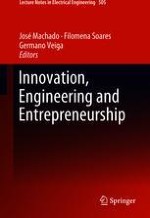2019 | OriginalPaper | Chapter
Scratch 3 – Beginners Programming Course in 3rd Year of Primary School
Authors : António Marques, Carina Guimarães, Ana Salgado
Published in: Innovation, Engineering and Entrepreneurship
Publisher: Springer International Publishing
Activate our intelligent search to find suitable subject content or patents.
Select sections of text to find matching patents with Artificial Intelligence. powered by
Select sections of text to find additional relevant content using AI-assisted search. powered by
